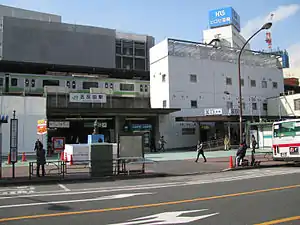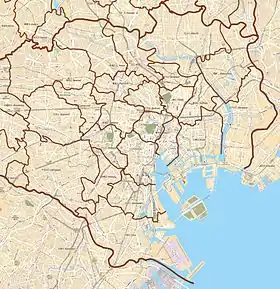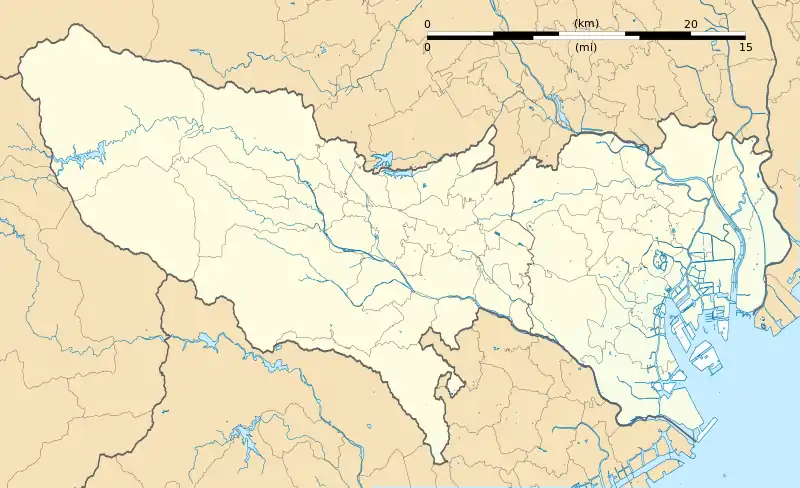Gotanda Station
Gotanda Station (五反田駅, Gotanda-eki) is a railway station in Shinagawa, Tokyo, Japan, operated by East Japan Railway Company (JR East), the private railway operator Tokyu Corporation, and the Tokyo subway operator Toei.
JY23 IK01 A05 Gotanda Station 五反田駅 | |||||||||||||||||||||||||||||||
|---|---|---|---|---|---|---|---|---|---|---|---|---|---|---|---|---|---|---|---|---|---|---|---|---|---|---|---|---|---|---|---|
 JR station, 2007 | |||||||||||||||||||||||||||||||
| Location | Shinagawa, Tokyo Japan | ||||||||||||||||||||||||||||||
| Operated by | |||||||||||||||||||||||||||||||
| Line(s) |
| ||||||||||||||||||||||||||||||
| History | |||||||||||||||||||||||||||||||
| Opened | 1911 | ||||||||||||||||||||||||||||||
| Services | |||||||||||||||||||||||||||||||
| |||||||||||||||||||||||||||||||
| Location | |||||||||||||||||||||||||||||||
 Gotanda Station Location within Special wards of Tokyo  Gotanda Station Gotanda Station (Tokyo)  Gotanda Station Gotanda Station (Japan) | |||||||||||||||||||||||||||||||
Lines
Gotanda Station is served by the following lines:
- JR East Yamanote Line
- Toei Asakusa Line (Station number A-05)
- Tokyu Ikegami Line - terminus station
Station layout
JR East
The JR East station consists of an elevated island platform serving two tracks. The station has a "Midori no Madoguchi" staffed ticket office.
| 1 | JY Yamanote Line | (Anti-clockwise) for Shinagawa, Tokyo, and Ueno |
| 2 | JY Yamanote Line | (Clockwise) for Shibuya, Shinjuku, and Ikebukuro |
Chest-height platform edge doors were installed on the Yamanote Line platforms in February 2015, with operation commencing in March.[1]
 JR platforms, 2016
JR platforms, 2016
Tokyu
The Tokyu station consists of one elevated island platform serving two tracks, located above the JR platforms.
| 1-2 | IK Tokyu Ikegami Line | for Hatanodai, Yukigaya-Ōtsuka, and Kamata |
 Tokyu platforms, 2016
Tokyu platforms, 2016
Toei
The Toei subway station consists of one underground island platform serving two tracks.
| 1 | A Toei Asakusa Line | for Nishi-magome |
| 2 | A Toei Asakusa Line | for Sengakuji, Nihombashi, and Oshiage KS Keisei Line lines for Keisei-Takasago, Keisei-Tsudanuma and Narita Airport HSHokusō Railway for Inba-Nihon-Idai KS Narita Sky Access Line for Narita Airport SR Shibayama Railway Line for Shibayama-Chiyoda |
 Toei platforms, 2007
Toei platforms, 2007
History
The JR station first opened on 15 October 1911.[2] The Tokyu Ikegami Line station opened on 17 June 1928.[3] The Toei Asakusa Line station opened on 15 November 1968.[3]
Passenger statistics
In fiscal 2013, the JR East station was used by 132,524 passengers daily (boarding passengers only), making it the 24th-busiest station operated by JR East.[4] Over the same fiscal year, the Tokyu station was used by an average of 108,025 passengers daily (entering and exiting passengers), making it the busiest station on the Ikegami Line.[5]
The daily passenger figures for each operator in previous years are as shown below.
| Fiscal year | JR East | Tokyu |
|---|---|---|
| 1999 | 133,202[6] | |
| 2000 | 132,411[7] | |
| 2005 | 126,137[8] | 101,969[9] |
| 2010 | 129,154[10] | 102,101[11] |
| 2011 | 127,996[12] | 101,904[13] |
| 2012 | 130,633[14] | 105,167[15] |
| 2013 | 132,524[4] | 108,025[5] |
- Note that JR East figures are for boarding passengers only.
Surrounding area
- Seisen University
- Rissho University
- Tokyo Health Care University
- NTT Medical Center Tokyo
- Ikedayama Park
See also
References
- 山手線五反田駅に可動式ホーム柵が設置される [Platform edge doors installed at Yamanote Line Gotanda Station]. Japan Railfan Magazine Online (in Japanese). Japan: Koyusha Co., Ltd. 25 February 2015. Retrieved 25 February 2015.
- 各駅情報(五反田駅) [Station information (Gotanda Station)] (in Japanese). Japan: East Japan Railway Company. Retrieved 26 December 2011.
- Terada, Hirokazu (July 2002). データブック日本の私鉄 [Databook: Japan's Private Railways]. Japan: Neko Publishing. ISBN 4-87366-874-3.
- 各駅の乗車人員 (2013年度) [Station passenger figures (Fiscal 2013)] (in Japanese). Japan: East Japan Railway Company. Archived from the original on 6 May 2001. Retrieved 6 September 2014.
- 2013年度乗降人員 [2013 Station passenger figures] (in Japanese). Japan: Tokyū Corporation. 4 June 2014. Retrieved 6 September 2014.
- 各駅の乗車人員 (1999年度) [Station passenger figures (Fiscal 1999)] (in Japanese). Japan: East Japan Railway Company. Retrieved 6 September 2014.
- 各駅の乗車人員 (2000年度) [Station passenger figures (Fiscal 2000)] (in Japanese). Japan: East Japan Railway Company. Archived from the original on 9 October 2014. Retrieved 6 September 2014.
- 各駅の乗車人員 (2005年度) [Station passenger figures (Fiscal 2005)] (in Japanese). Japan: East Japan Railway Company. Archived from the original on 9 October 2014. Retrieved 6 September 2014.
- 2005年度乗降人員 [2005 Station passenger figures] (in Japanese). Japan: Tokyū Corporation. 19 May 2006. Retrieved 6 September 2014.
- 各駅の乗車人員 (2010年度) [Station passenger figures (Fiscal 2010)] (in Japanese). Japan: East Japan Railway Company. Archived from the original on 6 October 2014. Retrieved 6 September 2014.
- 2010年度乗降人員 [2010 Station passenger figures] (in Japanese). Japan: Tokyū Corporation. 19 May 2011. Retrieved 6 September 2014.
- 各駅の乗車人員 (2011年度) [Station passenger figures (Fiscal 2011)] (in Japanese). Japan: East Japan Railway Company. Archived from the original on 8 October 2014. Retrieved 6 September 2014.
- 2011年度乗降人員 [2011 Station passenger figures] (in Japanese). Japan: Tokyū Corporation. 15 May 2012. Retrieved 6 September 2014.
- 各駅の乗車人員 (2012年度) [Station passenger figures (Fiscal 2012)] (in Japanese). Japan: East Japan Railway Company. Archived from the original on 7 October 2014. Retrieved 6 September 2014.
- 2012年度乗降人員 [2012 Station passenger figures] (in Japanese). Japan: Tokyū Corporation. 29 May 2013. Retrieved 6 September 2014.
External links
| Wikimedia Commons has media related to Gotanda Station. |
- JR East station information (in Japanese)
- JR Gotanda Station Map (JR East)
- Gotanda Station (Toei) (in Japanese)
- Gotanda Station (Tokyu) (in Japanese)